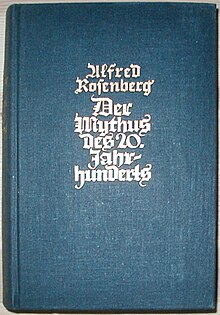
Back أسطورة القرن العشرين Arabic Міф дваццатага стагоддзя Byelorussian Митът на XX век Bulgarian Der Mythus des 20. Jahrhunderts German El mito del siglo XX Spanish اسطوره بیستمین سده Persian Le Mythe du vingtième siècle French The Myth of the Twentieth Century ID Il mito del XX secolo Italian 二十世紀の神話 Japanese

The Myth of the Twentieth Century (German: Der Mythus des zwanzigsten Jahrhunderts) is an influential, pseudo-scientific, pseudo-historical book by Alfred Rosenberg, a Nazi theorist[1] who was one of the principal ideologues of the Nazi Party and editor of the Nazi paper Völkischer Beobachter. Rosenberg was later convicted for crimes against humanity at the Nuremberg trials and executed in 1946.
In the book Rosenberg contends that the Aryan race is the originator of ancient civilizations which later declined and fell due to inter-marriage with "lesser races". Holding what he considers Aryan civilizations to be the pinnacle of humanity, he blames Semitic influences for moral and social degradation, and holds that the State must ensure that "higher" races must rule over the "lower" races and not interbreed with them.
Published in 1930, the book sold more than one million copies by 1944 thanks to Nazi support. Hitler awarded a State Prize for Art and Science to Rosenberg for the book in 1937. The document accompanying the prize "praises Rosenberg as a 'person who has, in a scientific and penetrating manner, laid the firm foundation for an understanding of the ideological bases of National Socialism'".[2] The content of the book is a mix of racist pseudo-science and mysticism which makes the claim that the "Nordic race" originated in Atlantis and that their nobility justified the enslavement and even mass murder of non-Aryan races.[3]
Some members of the Nazi leadership found some of this material embarrassing, but it was also publicly praised,[4] often by the same Nazi leaders who disparaged the work in private.[5][6][7]
- ^ Silberklang, David. "Roots of Nazi Ideology". Yad Vashem. Retrieved 31 December 2022.
- ^ The Persecution of the Catholic Church in the Third Reich: Facts and Documents. p. 402
- ^ Viereck, p. 233
- ^ Hexham, Irving (January 2007). "Inventing 'Paganists': a Close Reading of Richard Steigmann-Gall's the Holy Reich". Journal of Contemporary History. 42 (42): 59–78. doi:10.1177/0022009407071632.
- ^ Goebbels, Ralf Georg Reuth; Piper; ISBN 3-492-03183-8, p. 304; Original: "philosophischer Rülpser".
- ^ Eatwell, 1995, p. 119.
- ^ Steigmann-Gall, Richard (2003-04-21). The Holy Reich: Nazi Conceptions of Christianity, 1919–1945. Cambridge, England: Cambridge University Press. p. 93. ISBN 978-1-107-39392-9.
Goebbels was characteristically succinct, describing the book as an 'ideological belch.'